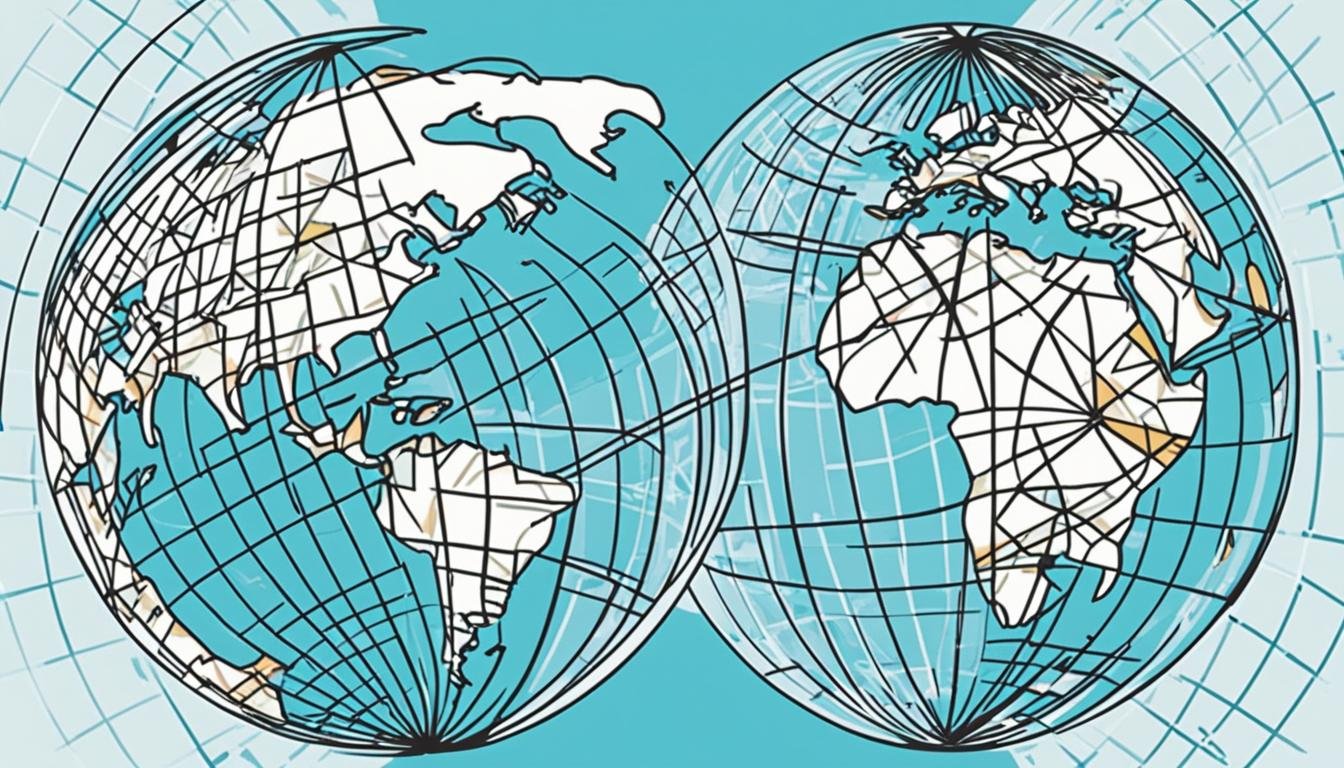Role of Investment Banks in Global Trade Financing
Did you know the worth of global trade finance is in the trillions each year? Investment banks are key in making this huge scale of cross-border trade happen. They offer innovative solutions for trade finance. Thanks to their skills and networks, investment banks reduce risks in global trade. They also boost the growth and efficiency of international trade transactions.
Key Takeaways:
- Investment banks play a crucial role in global trade financing by providing innovative trade finance solutions.
- They offer a range of investment banking services specifically tailored to companies engaged in cross-border trade.
- Trade finance encompasses the financial instruments and products used to facilitate international trade and commerce.
- Investment banks facilitate trade finance by offering a wide range of financial products and solutions.
- The Global Trade Finance Program (GTFP) expands the capacity of banks to deliver trade financing, particularly in emerging markets.
What Is Trade Finance?
Trade finance is key in making global trade work smoothly. It uses financial tools to help businesses trade safely. This support is essential for both importers and exporters, lowering the risks of international trade.
Banks and companies use special financial instruments in trade finance. These tools, like credit lines and letters of credit, help make trading easier. They provide the funds needed and lower trade risks, helping businesses grow globally.
Trade finance is vital in cutting down the risks of global trade. It helps increase international trade.
How Trade Finance Works
Trade finance involves a third-party to reduce payment and supply risk. Exporters receive payment from the third-party. Meanwhile, importers might get credit.
There are many key parties involved in trade finance. These include banks, finance companies, importers, and exporters, among others. This type of financing helps manage risks like currency changes and political issues.
Tools such as lines of credit, letters of credit, factoring, and insurance are used. They help make transactions smoother.
Understanding the Role of Third-Party in Trade Finance
A third-party in trade finance protects against risk. They make sure exporters get paid and importers receive goods. These third-parties usually are banks or finance companies.
This setup builds trust and reduces trade uncertainties. The third-party checks the order and confirms transaction terms. It protects everyone involved.
For exporters, it means getting paid on time and less payment risk. Importers can enjoy credit periods. This helps them fulfill orders without immediate payment.
Parties Involved in Trade Finance
All the different parties involved are crucial for successful trade finance:
- Banks: They offer needed financial support for trade.
- Trade Finance Companies: They provide specialized trade finance services.
- Importers: They buy goods from abroad.
- Exporters: They sell goods to foreign markets.
- Insurers: They help cover payment risk and other risks.
- Export Credit Agencies: They offer support for exports through guarantees, insurance, and loans.
Together, these parties help trade go smoothly, reducing risks and opening up global opportunities.
Trade Finance Instruments
Trade finance uses special financial tools for secure and efficient transactions:
- Lending lines of credit: Banks offer this support for trade activities.
- Letters of credit: Banks assure payment to exporters with specific documents.
- Factoring: Exporters sell their receivables at a discount for quick cash flow.
- Insurance: This covers various risks like non-payment or political instability.
These tools are key in protecting importer and exporter interests. They make sure trade runs smoothly.
| Parties Involved in Trade Finance | Roles and Responsibilities |
|---|---|
| Importers | Place trade orders, receive goods, and make payments as per agreed terms. |
| Exporters | Supply goods, ensure compliance with trade terms, and receive payment. |
| Banks | Provide financial products and services, act as intermediaries, verify trade orders, and facilitate payment. |
| Trade Finance Companies | Offer specialized trade finance solutions, provide funding options, and mitigate trade-related risks. |
| Insurers | Offer insurance coverage against various trade risks, ensuring protection for importers and exporters. |
| Export Credit Agencies | Provide financing, insurance, and guarantees to support export transactions and mitigate risks. |
Understanding trade finance and its key players helps businesses. They can navigate international trade better, reduce risks, and grow globally.
Role of Investment Banks in Trade Finance
Investment banks are key to trade finance, focusing on capital financing and trading. Unlike commercial banks, they don’t take deposits or give loans. Instead, they provide crucial financing and trade services.
These banks link firms with financial markets by matching sellers and investors. They help businesses go public and support bond offerings. This way, they boost market efficiency, aid business growth, and push the economy forward.
“Investment banks bridge the gap between companies seeking capital and investors looking for investment opportunities. They bring together supply and demand in the capital market, playing a crucial role in facilitating capital formation and price discovery.”
Investment banks help companies get funds for growth and new projects. They aid in raising capital through IPOs, secondary offerings, and private placements. These banks also offer advice during the capital-raising process.
Through their trading, investment banks aid in market liquidity and price finding. They buy and sell financial products like stocks and bonds. This activity is vital for fair capital allocation and investment choices.
These banks also play a big part in mergers and acquisitions (M&A). They offer advice and help companies grow through deals. They assist in evaluating targets, making deals, and negotiating good terms for everyone.
Investment banks are crucial for trade finance, ensuring smooth capital flow and aiding in capital formation and price setting. Their skills, connections, and financial services help in the growth and stability of global trade and investment.
The Global Trade Finance Program
The Global Trade Finance Program (GTFP) helps banks in emerging and difficult economies increase trade financing. It aims to reduce trade transaction risks. This ensures steady financing for imports and exports.
Through the Global Trade Finance Program, the International Finance Corporation (IFC) offers payment risk guarantees. These guarantees cover letters of credit, promissory notes, and more. The GTFP makes finance more accessible and lowers cash needs.
Risk Mitigation and Trade Financing
The main goal of the GTFP is to lessen trade transaction risks in emerging markets. It gives banks guarantees. This allows them to support businesses with limited trading opportunities.
Emerging markets face challenges like political unrest and currency issues. The GTFP helps banks reduce payment risks. This enables the extension of trade financing, fostering market growth.
Supporting Emerging Markets
The GTFP targets emerging markets with limited access to trade finance. These areas have growth and development potential but lack resources and infrastructure.
By reducing risks and aiding trade finance, the GTFP lets businesses in these markets trade globally. This promotes economic growth and opens up chances for sustainable development.
The Role of the Global Trade Finance Program
The GTFP is key in maintaining trade credit flow in emerging markets. It decreases payment risk and improves finance access. This helps importers and exporters, developing solid trade connections.
The program works with banks to boost their trade financing abilities. It catalyzes trade, ensuring businesses have the financial backing for international deals.
GTFP Benefits and Impact
The Global Trade Finance Program brings many advantages to emerging markets and international traders. These benefits include:
- Risk mitigation: The GTFP assists banks in reducing payment risks, facilitating easier access to trade financing for businesses.
- Enhanced trade lines: The program enhances trade finance capabilities, supporting robust trade lines and opening new opportunities for merchants.
- Reduced cash collateral requirements: It lowers the need for large cash collateral, making trade finance more reachable for emerging market businesses.
- Increased trade activities: The GTFP encourages more trade credit flow, helping businesses go global and stimulating economic growth in emerging markets.
The Global Trade Finance Program: A Catalyst for Trade
“The Global Trade Finance Program is a vital catalyst for trade, ensuring that businesses in emerging markets have the necessary financial support to engage in cross-border transactions. By mitigating payment risk and facilitating trade financing, the program plays a crucial role in promoting economic growth and creating opportunities for sustainable development.”
GTFP Participating Countries
| Country | Region |
|---|---|
| Afghanistan | South Asia |
| Bangladesh | South Asia |
| Ghana | Sub-Saharan Africa |
| Indonesia | East Asia and the Pacific |
| Morocco | Middle East and North Africa |
| Nigeria | Sub-Saharan Africa |
The Global Trade Finance Program is active across various countries, supporting emerging market businesses around the world.
Advantages of Trade Finance
Trade finance gives companies in international trade big benefits. First, it lowers the chance of not getting paid or not receiving goods. This gives both buyers and sellers peace of mind. Trade finance services help avoid money loss from unpaid bills or shipping mistakes.
It also boosts cash flow and work efficiency. Firms can use their owed money to get loans. This helps cover daily expenses and grow the business. Plus, trade finance lets companies get cash early based on future exports.
Another key benefit is helping firms earn more money. With trade finance, they can tackle bigger projects and reach new markets. This financial boost lets businesses grow and fully use their potential.
Trade finance is also great for avoiding money troubles. It offers tools like credit lines and selling invoices for cash. These help manage money ups and downs and solve short-term problems. They provide a safety net during tough times or surprises, helping businesses stay afloat.
“Trade finance offers companies engaged in international trade a range of advantages, including risk reduction, cash flow improvement, revenue increase, and financial hardship prevention.”
– Trade Finance Specialist
In short, trade finance offers companies big advantages for global success. It reduces risks, enhances cash flow, increases earnings, and helps avoid financial issues. Trade finance solutions support companies to succeed in the competitive world of international trade.
How Investment Banks Facilitate Trade Finance
Investment banks are crucial for international trade finance. They offer a wide range of trade finance solutions and financial products. This helps trade transactions to run smoothly and reduces global trade risks.
Investment banks support trade finance in many ways. They provide financial tools like lending, letters of credit, factoring, export credit, and insurance. These tools help traders get the financing they need. They also protect them from the risks of non-payment and not getting goods.
Investment banks use their expertise and networks to manage trade between various parties. They serve as intermediaries. This ensures that funds flow smoothly and reduces the difficulties of cross-border trade.
Investment banks contribute to the smooth functioning of financial markets and the growth of international trade.
Investment banks help reduce risks in global trade by offering trade finance solutions. They aid companies in dealing with financial market complexities. They also provide ways to finance capital and trading activities.
Investment banks also help financial markets grow and work more efficiently. They play a role in linking sellers and investors. This supports capital formation and price setting. It leads to market development and efficiency, which drives economic growth.
By providing trade finance solutions, investment banks make financing more accessible for traders. Their risk mitigation and tailored financial products are vital. They play a crucial role in expanding global markets through trade finance.
The Key Functions of Investment Banks in Trade Finance:
- Coordinating trade transactions between importers and exporters
- Mitigating the risks associated with cross-border trade
- Providing financial instruments like lending lines of credit, letters of credit, factoring, export credit, and insurance
- Acting as intermediaries between different parties involved in trade finance
- Promoting the growth and efficiency of financial markets through capital market intermediation and trading
Investment banks are key in global trade finance. They offer solutions, reduce risks, and help financial markets grow. Their products and expertise provide crucial support. They help traders access finances and protect them from risks. Hence, they are essential for the efficient working and growth of international trade.
GTFP Sustainable Shipment LCs
The Global Trade Finance Program (GTFP) has teamed up with the Banking Environment Initiative (BEI). They’ve created the Sustainable Shipment Letter of Credit (LC). This new financial tool aims to boost the trade of goods that are sustainably sourced.
It also wants to help sustainable global supply chains grow. The Sustainable Shipment LC gives special treatment for agricultural goods trade.
These goods must meet recognized sustainability standards. Banks in the program can share its benefits with their clients. This encourages them to adopt sustainable trading practices.
The GTFP supports trades that benefit the climate too. It offers price incentives or longer tenors for climate-positive equipment and projects.
Conclusion
Investment banks are key in helping global trade. They provide finance solutions to companies in international trade. This helps businesses with their financing needs and eases transactions across borders.
They use their knowledge to assist companies navigate the global market. With their support, businesses can handle the complex nature of international trade.
The Global Trade Finance Program (GTFP) boosts banks’ ability to offer trade finance. This is especially true in emerging markets. By working with partners and using new solutions, they improve global trade.
This action helps businesses grow and economies do well. Investment banks have a broad network and deep knowledge. They cater to companies’ needs in cross-border trade.
They provide important services like trade credit and export finance. This boosts global trade. It also ensures financial markets run smoothly.








